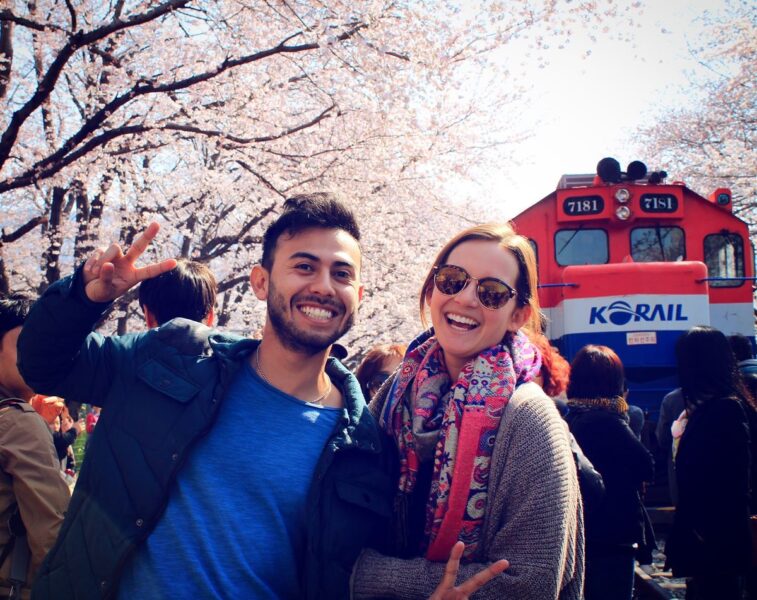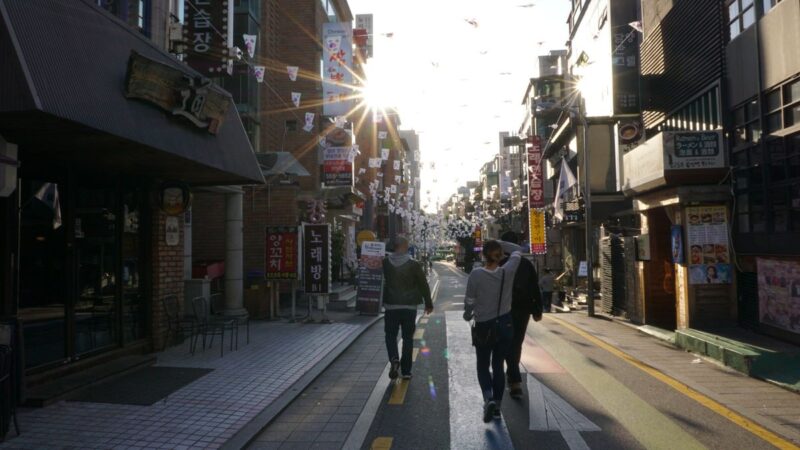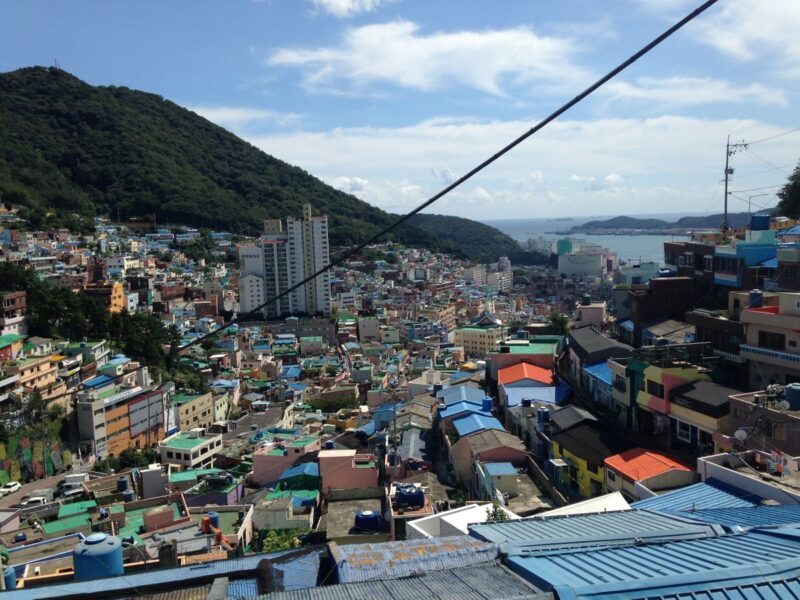Teaching English in South Korea: How to Get a Job + Tips
This guide to teaching English in South Korea is authored by Kat.
Teaching English in South Korea wasn’t actually on my radar until a friend randomly mentioned she had taught there years before. At the time, we were both living in Ecuador, and moving to Asia wasn’t something I had in mind, so I brushed it off and didn’t ask too many questions.
Fast forward a few years, and I was backpacking in Europe, on the verge of running out of cash, and needed a job. I was plotting and planning my next move when *poof* our long-ago conversation popped into my head. I immediately reached out to her, and after getting a few helpful tips, I started the job hunt.
While it might not be the dreamiest story of how I ended up teaching English in South Korea, it’s the honest one. It also shows you that while I had zero ideas of what to expect about living in Korea, the country blew me away.
It left me wanting to shout from the rooftops about a great opportunity awaiting all those interested in teaching English abroad.
From the insanely unique culture to the friendly locals and spicy food, this country has a lot to love. With its endless maze of alleys and beautiful places to visit, it’s a country you’ll want more than a short trip to really get to explore.
Without further ado, let’s dive into the requirements to get hired and what it’s really like living and working in South Korea.
Table of Contents
The Requirements for Teaching English in South Korea
If you have the idea in your head to teach English abroad, South Korea is an excellent option. Most people are attracted to teaching in South Korea due to the pretty high pay, relative ease of managing the cost of living, a plethora of entertainment options after working hours, and a big expat community.

If all of those sound like pretty good reasons for you to give teaching in Korea a chance, here’s what you need to be able to apply for a great teaching job.
The requirements you need to get hired:
- A Bachelor’s degree in any subject
- A TEFL certificate (I’m certified by ITTT and can thoroughly recommend them. You’ll get 10% off with this link)
- Native English speaker (some schools will make exceptions)
- A clean criminal background check (done in your country of residence)
- Health check clearance (done upon arrival in Korea)
- Ability to sign a 1-year contract (typically)
While some of these requirements are more flexible than others, getting a job teaching in South Korea won’t be too difficult for you if you meet all of these on the list.
Keep in mind that most of these requirements are in place by the government, not the school. So while a school can be flexible as to whether or not you can sign a 1-year contract, they most likely won’t be able to budge on you having a Bachelor’s degree because this is a necessary document you’ll need to get a work visa.
RELATED: 7 Best Online TEFL Courses to Teach English Abroad!
How to Find a Teaching Job in South Korea
Now that you know you have the requirements to get hired, it’s time to find you a great job!
Public School vs. Hagwon
The first decision you’ll need to make is whether you’d like to work at a public school or a private school, better known as a hagwon.

While the requirements to teach at both are pretty similar, your daily life as a teacher will vary. Most people who come to work for a public school go through EPIK or English Program in Korea. This is the program established by the Ministry of Education.
In general, working at a public school means a lower salary but more vacation days. Also, with EPIK, the Ministry of Education will place you in a school of their choosing, so you won’t have much say in where you end up teaching.
Whereas, if you choose to teach at a hagwon, you’ll most likely have a higher salary, but you’ll have fewer vacation days and typically work longer hours.
You will have a complete say over where you decide to teach, so you can be strategically based on where in the country you’d like to live and what age group you’d like to teach.
RELATED: How to Teach Abroad – The Guide to English Teaching Anywhere
Great Teaching English Job Platforms for South Korea
If you’d prefer to teach at a public school, I recommend applying directly to EPIK.
If you’d rather teach at a hagwon, I recommend finding a job before moving to South Korea. While it is possible to get hired in person, it’s easier to deal with paperwork from your home country.
It can be hard to guess what documents you’ll need, and it’s helpful when you have someone from your school walking you through the process.
That said, it’s entirely feasible to switch schools from within the country. If you finish your contract at one school and would like to try somewhere new in the following year, you shouldn’t need to return to your home country to renew your visa.
I recommend using these job platforms to find teaching jobs:
In my experience, Dave’s ESL Cafe tends to have the most job vacancies. This is also the platform I used to get hired when I taught in South Korea but before you start applying, keep reading for some big tips to avoid a “blacklisted” school.
RELATED: 19 of The Best Countries to Teach English Abroad: Salary vs Cost of Living
Unlock FREE Flights and Hotels!
Credit cards aren’t just for spending—they’re your ticket to epic travel rewards!
By using the right card for your everyday purchases, you could earn points for free flights, hotel stays, and more. No tricks, just smarter travel. Ready to see how?
Tips for Getting Hired at a Great School While Teaching English in South Korea
With so many job opportunities for teaching in South Korea, it’s important to note that not all schools are created equal before you start applying to every one of them.

I’ll talk more about this below, but teaching English in South Korea can be very demanding. With long hours, high expectations from your boss and the parents, and typically very engaged students who demand your attention, the last thing you want is to get stuck at a school that doesn’t care about its teachers.
These schools are typically referred to as “blacklisted” schools in South Korea. Schools get blacklisted by teachers if they regularly teach their staff poorly, don’t pay on time, actively take advantage of their contract, etc.
To ensure you find a great school, I recommend you:
- Research the school on your own before applying. Check their website and Facebook pages. This will help ensure they’re a real school and not a scam.
- Head to Facebook groups to see if anyone has experience working with the school. A simple search in the group should show you if any previous teachers are warning others away. Keep in mind, though, that one person’s experience might not reflect yours. You don’t know the person writing the warning, so take it with a grain of salt. Unless, of course, their post has received countless comments from other teachers, all agreeing.
- Ask to speak with current teachers before you accept a job offer. This will give you some perspective on the job. I’d take it as a red flag if no one is willing to chat with you.
RELATED: How NOT to Get Screwed Over While Choosing the Best Online TEFL Course
Settling into Living in South Korea
Living abroad and traveling the world has been a dream come true, but moving abroad isn’t for everyone. It’s a significant change that takes some time, patience, and an open mind to get into.
However, South Korea is a fantastic option if this is your first time moving to another country. A big community of expats here will help you navigate the cultural differences and adjust to the country at a quicker pace.

Because of this, Koreans are also more used to foreigners than in smaller countries. So while not it’s 100% the case, many people are kind and patient with you, even if you don’t share the language.
Most jobs on the platforms above will be in the Seoul area. I lived just outside Seoul and fell utterly in love with the city. If I went back and did it all over again, the only change I would make is to work closer to the heart of the city.
Many jobs you’ll find are probably like mine. The school itself is somewhere around the city limits. Although considered a town by Korea’s standards, the place I lived was massive with millions of people. There was plenty to do and see, but in my opinion, nothing beat the buzz of Seoul.
There are a few notable areas throughout the country for you to choose from.
Living in Seoul, South Korea
Unlike any other city I’ve ever been to, Seoul is by far my favorite megacity after traveling Asia extensively. It’s truly one of those cities that never sleeps. Many coffee shops are open 24/7, and there are also bars, restaurants, and karaoke rooms open at any given time, day or night.

Seoul is massive, but the metro is very well organized, so it’s pretty easy to get around. While some neighborhoods are extremely crowded, like the popular shopping district, Myeong-dong, there are much smaller, quieter neighborhoods to find just by turning away from the main street.

I didn’t realize before moving to Seoul just how mountainous the city is. Surrounded by hiking trails, many of which you can even get to by metro, it’s the perfect way to spend your weekends in fall and spring.
Living in Jeonju, South Korea
Jeonju is the culinary capital of South Korea. This is a popular destination for people coming to Seoul who want to immerse themselves in the Korean culture. It’s much more laidback, calm, and traditional, especially when compared to Seoul.

Similar to Seoul, it’s effortless to get in and out of nature in Jeonju. The mountains and countryside are just right outside of the city limits here.
This is a great option for people who want to experience living in South Korea but aren’t too keen on living in a busy metropolis.
Living in Busan, South Korea
Busan is the second-largest city in South Korea, located on the country’s southeastern coast. After visiting Busan, my husband and I seriously considered moving here. Although the water and fresh air swayed me, at the end of the day, Seoul still won my heart.

Although still a large city, Busan feels much smaller than Seoul.
One thing to note here, if you enjoy swimming freely in the ocean, Busan is not your place. The sea is only “open” in the summer season, and even then, they tend to have lifeguards swarming the beach, ensuring people aren’t going deep.
Living in Jeju, South Korea
Jeju is lovingly known as “Korea’s Hawaii.” This small island sits off the country’s southern coast and is a wonderful place to visit or live. It’s a hot tourist attraction, so daily life in the tourist season compared to off-season will vary incredibly.

While there’s plenty to do in Jeju, it won’t be nearly as entertaining as the cities on this list unless you’re happiest in nature and OK with a lot of rain.
Keep in mind that Jeju might be the toughest place to find a job teaching English in Korea since there are fewer schools here than in other parts of the country.
The Reality of Teaching English in South Korea
In general, I genuinely loved teaching English in South Korea. It’s a fantastic country that opened its arms to me. The Koreans I worked with took me under their wing and became beautiful friends of mine.
South Korea gets four full seasons, so in terms of diversity in weather, it’s a fun spot that has it all – skiing in the winter, hiking in the fall and spring, and beach vacations in the summer. That said, the seasons are extreme. Winter is frigid, summer is sweltering, and spring and fall are perfect.

Now, of course, just like anywhere, teaching in South Korea isn’t all butterflies and rainbows. There are some serious downfalls to deciding to work in this country that I think are only fair to mention. With that, you can weigh the pros and cons for yourself and determine if it’s the right place to try living.
The demands of a teacher here are high. A vital pre-requisite to deciding if you should move to South Korea to teach English is first deciding is this the right career for you?
If you’re not interested in teaching and are using it more to move abroad, there are plenty of other job opportunities around the world that might be a better fit for you. If you’re genuinely interested in teaching, this country pays well and typically respects its teachers.
Your students here are primed to learn. Especially if you teach at a hagwon, you’ll hardly have to deal with massive student behavioral issues, and your boss will expect you to maintain strict classroom management rules. To me, this was a double-edged sword.
Teaching was easier here than in other countries because the students are there to learn, but I was mainly teaching 3-4 year olds, and it was hard for me to understand that they were expected to be little adults, not children in the classroom.
That being said, my time teaching in South Korea was seriously special. If you’re interested in teaching English abroad, South Korea should be high on your list!
More English Teacher Jobs
>>> BIO
Kat Smith is a serial expat who has lived around the world for the past 10 years. She’s the founder of the popular expat website, A Way Abroad. Currently, she’s living in Albania, but who knows where she’ll end up next.








